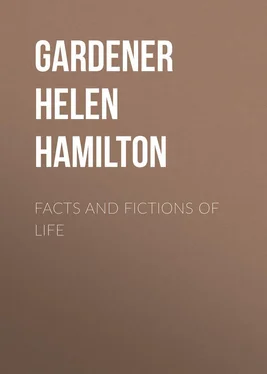Helen Gardener - Facts and Fictions of Life
Здесь есть возможность читать онлайн «Helen Gardener - Facts and Fictions of Life» — ознакомительный отрывок электронной книги совершенно бесплатно, а после прочтения отрывка купить полную версию. В некоторых случаях можно слушать аудио, скачать через торрент в формате fb2 и присутствует краткое содержание. Жанр: foreign_antique, foreign_prose, на английском языке. Описание произведения, (предисловие) а так же отзывы посетителей доступны на портале библиотеки ЛибКат.
- Название:Facts and Fictions of Life
- Автор:
- Жанр:
- Год:неизвестен
- ISBN:нет данных
- Рейтинг книги:4 / 5. Голосов: 1
-
Избранное:Добавить в избранное
- Отзывы:
-
Ваша оценка:
- 80
- 1
- 2
- 3
- 4
- 5
Facts and Fictions of Life: краткое содержание, описание и аннотация
Предлагаем к чтению аннотацию, описание, краткое содержание или предисловие (зависит от того, что написал сам автор книги «Facts and Fictions of Life»). Если вы не нашли необходимую информацию о книге — напишите в комментариях, мы постараемся отыскать её.
Facts and Fictions of Life — читать онлайн ознакомительный отрывок
Ниже представлен текст книги, разбитый по страницам. Система сохранения места последней прочитанной страницы, позволяет с удобством читать онлайн бесплатно книгу «Facts and Fictions of Life», без необходимости каждый раз заново искать на чём Вы остановились. Поставьте закладку, и сможете в любой момент перейти на страницу, на которой закончили чтение.
Интервал:
Закладка:
"We have to keep three trenches open all the time, because the Catholics have to go in consecrated ground and they don't allow the 'generals' and Protestants in there. Then the other trench is for dissected bodies from hospitals and the like."
"Are not many, indeed most of those, also, Catholics?" I asked.
"Yes, I guess so; but they don't go in consecrated ground, because they aint whole." This with no sense of levity.
"Are not many of the unknown likely to be Catholics, too?"
"Yes, but when we find that out afterward, we dig them out if they were not suicides, and put them in the other trench. If they were suicides, of course, they have to stay with the generals. You see, we number each section; then we number each box, and begin at one end with number one and lay them right along, so a record is kept and you can dig any one out at any time."
"Then this earth – if we may call it so – is constantly being dug into and opened up?" I queried.
"I should think it would kill the men who work, and the insane and imbecile who must live here." "Well," he replied, smiling, "prisoners have to do what they are told to, whether it kills 'em or not, and I guess it don't hurt the idiots and lunatics none. They're past hurting. They're incurables. They never leave here."
"I should think not," I replied. "And if by any chance they were not wholly incurable when they came, I should suppose it would not be long before they would be. Where does the drinking water come from?"
"Drive wells, and – "
"What!" I exclaimed, in spite of my determination when I went that I would show surprise at nothing.
He looked at me in wonder.
"Yes, it is easy to drive wells here. Get water easy."
This time I remained silent. I did not wish to frighten away any farther confidences which he might feel like imparting.
There is one road from end to end of the island. The houses for the male lunatics and imbeciles are on the highest point overlooking at all times the trenches and at all times within hearing of whatever goes on there. The odors are everywhere so that night and day, every one who is on the island breathes nothing else but this polluted air, except as a strong wind blows it, at times, from one direction over another. The women's quarters – much larger and better houses – are at the other end of the island. Not all of these overlook the trenches.
Every fair day all these wretched creatures are taken out to walk. Where? Along this one road; back and forth, back and forth, beside the "dead trenches." To step aside is to walk on "graves" for about half the way. We sometime smile over the old joke that the Blue Laws allowed nothing more cheerful than a walk to the cemetery on Sunday. All days are Sundays to these wretches who depend on the "civilized" charity of our city. All laws are very, very blue; all walks lead through what can by only the wildest abandon of charity be called by so happy a name as a "cemetery," and even the air and water the city gives them is neither air nor water; it is pollution.
A gentleman by my side watched the long procession of helpless creatures walk past. One man waved his hand to me and mumbled something and smiled – then he called back, "Wie geht's? Wie geht's?" and smiled again. Several of the wretched creatures laughed at him; but when I smiled and bowed, nearly half of the line of three hundred, turned and joined in his salutation. They filed past four times (the whole walk is so short), and they did not fail each time to recognize me and bid for recognition. If they know me as a stranger, I thought, they know enough to understand something of all this ghastliness. The line of women was a long, long line. I was told that in all there were fourteen hundred women, and nearly five hundred men on the island. The line of women broke now and then as some poor creature would run out on the grass and pluck a weed or flower, and hold it gayly up or hide it in her skirts. One waved her hand at us, and said in tones that indicated that she was trying to assume the voice and manner of a public speaker: "The Lord deserteth not His chosen!" I did not know whether in her poor brain, they or we represented the chosen who were not to be deserted. Another said gayly and in an assumed lisp and voice of a little girl (although she must have been past fifty), "There's papa, oh, papa, papa, papa! My papa!" This to the gentleman who stood beside me. He smiled and waved his hand to her. Then he said, between his teeth:
"Civilized savages! To have them here! "
"It don't hurt 'em," said the officer beside us. "They're incurables. They won't any of 'em remember what they saw for ten minutes. People don't understand crazy folks and idiots. They're the easiest cowed people in the world. Long as they know they're watched, they'll do whatever you tell them – this kind will. They're harmless."
"But why have them here?" I insisted. "If they are to be poisoned, why not do it more quickly and – "
"Poisoned!" he exclaimed, astonished. "Why, if one of the attendants was caught even striking one, he'd be dismissed quick. They get treated well. Only it is hard to keep attendants. We can't get 'em to stay here more than a month or so – just till they get paid. We have to go to the raw immigrants to get them even then. Nobody else will come."
"Naturally," remarked the gentleman beside me.
"Yes, it's kind of natural. This kind of folks are hard to work with, and the men attendants get only about seventeen to twenty dollars a month, and the women from ten to twelve dollars."
"So the attendants of these helpless creatures are raw immigrants," I said; "who, perhaps, do not speak English, who are constantly changing. The water they get is from driven wells, the sights and exercise are obtained from and in and by the dead trenches. The air they breathe is like this, night and day, you say, and no one ever leaves alive when once sent here."
"No one."
"Who does the work – the digging, the burying, the handling of the dead, the carting, and the work for the insane?"
"Medium term prisoners. All these are from one to six months men," waving his hand over the men working below us in the horrible trench.
"Do you think they leave here with an admiration for our system of caring for the city's dead – whether the death be social, mental, or physical? Do they go back with a desire to reform and become like those who devise and conduct this sort of thing?"
He laughed.
"Why, it's just a picnic for them to come up here. You can't hardly keep 'em away with a club. Of course, the same ones don't work right here long; but when a fellow gets sent up to any of these places, he comes over and over until he gets ambitious to go to Sing Sing and be higher toned."
I thought of the same information given me at the Police and Criminal Courts a little while ago. I wondered if there might not be some flaw somewhere in the whole reformatory and punitive system. From the time a fourteen-year-old boy is taken up for breaking a window; sent to the reform school, where he is herded with older and worse boys, until he passes through the police court again, – let us say at sixteen, as a "ten-day drunk," – to herd again in a windowless prison van, packed close with fifteen hardened criminals (as I saw a messenger boy of fifteen on my way to the island), and taken where for ten days he enjoys the society of the most abandoned; returns to town the companion of thieves; and goes the next time for three or six months for petit larceny, then for some graver crime, on and up. At last, when he has no more to learn or to teach, he is given a cell or room alone until the State relieves him of the necessity of following the course which has been mapped out for and steadily followed by so many. He knows when he is a three months' man where he is going at last. Has he not helped to dig the trenches for the men who looked so hard and vile to him when he broke that window and stood in the Police Court by their sides?
Читать дальшеИнтервал:
Закладка:
Похожие книги на «Facts and Fictions of Life»
Представляем Вашему вниманию похожие книги на «Facts and Fictions of Life» списком для выбора. Мы отобрали схожую по названию и смыслу литературу в надежде предоставить читателям больше вариантов отыскать новые, интересные, ещё непрочитанные произведения.
Обсуждение, отзывы о книге «Facts and Fictions of Life» и просто собственные мнения читателей. Оставьте ваши комментарии, напишите, что Вы думаете о произведении, его смысле или главных героях. Укажите что конкретно понравилось, а что нет, и почему Вы так считаете.












![John Bruce - The Lettsomian Lectures on Diseases and Disorders of the Heart and Arteries in Middle and Advanced Life [1900-1901]](/books/749387/john-bruce-the-lettsomian-lectures-on-diseases-and-disorders-of-the-heart-and-arteries-in-middle-and-advanced-life-1900-1901-thumb.webp)